Markets
When designing a humanitarian intervention and deciding whether to use CVA, a market analysis should be part of the overall response analysis. Supporting markets to function well has been shown to lead to faster recovery and increased resilience in disaster affected areas.
Many organizations have invested in the development of tools to support market analysis and are considering market-based programming more holistically. This includes interventions that use the market (such as cash transfers to affected populations), as well as interventions that directly support markets (such as conditional grants to traders to get their market back up and running).
Related initiatives
Featured content

Introduction to Market Analysis
Course
This 30 minute online course provides an introduction to the analysis of markets in emergency contexts, with input from some of the world’s leading thinkers on the topic.

A Practical Guide to Market Analysis in Humanitarian response
Course
A three to four hour online course designed to provide future humanitarian market assessment team members with a solid understanding of theory and steps of market assessments so that they can join assessment teams prepared with a basic understanding of what they will be doing and why.
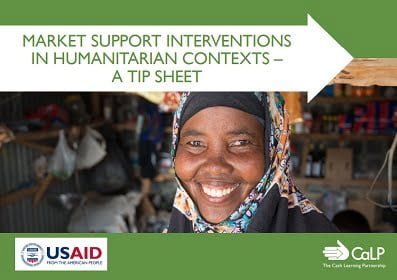
Market Support Interventions in Humanitarian Contexts – a Tip Sheet
Guidelines and Tools
This tip sheet defines what market support programming in humanitarian contexts is, and what it can look like in practice. It enables humanitarian practitioners to systematically consider market support interventions alongside other programme activities. The scope includes support interventions focusing on supply/availability and on demand/access. The tip sheet is based on secondary data...

Market Based Programming (MBP)
Guidelines and Tools
Market Based Programming (MBP) in Oxfam’s work means we always consider existing markets – through assessments, analysis and programming – across all phases of a response and across all technical sectors. You can also watch the videos below which are available in English, Spanish, Arabic and French.
Thematic lead
Latest
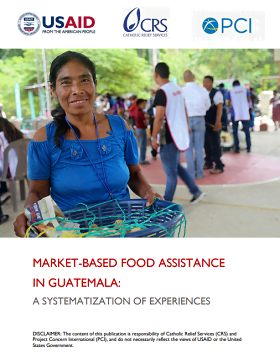
Market-based Food Assistance in Guatemala: A Systematization of Experiences
Guidelines and Tools
In April 2017, at the request of the United States Agency for International Development’s (USAID) Office of Food for Peace (FFP) in Guatemala, Catholic Relief Services (CRS) and Project Concern International (PCI) designed a process to gather and synthesize the experiences of food assistance...

Review of Food for Peace Market-Based Emergency Food Assistance Programs: Sierra Leone Case Study Report
Report
Sierra Leone represents a remarkable experiment in market-based emergency programming using unconditional cash transfers and some conditional cash transfers Sierra Leone reflects the challenges of providing food assistance in the wake of a major infectious disease epidemic. Food insecurity increased due...
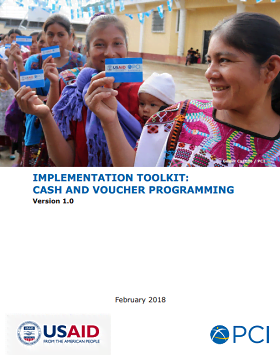
Implementation Toolkit: Cash and Voucher Programming
Guidelines and Tools
This set of tools developed by PCI seeks to harmonize language and approaches for use by teams involved in the design and implementation of cash transfer programs and is not intended to be a complete guide for design and implementation. The tool box focuses on the crucial steps within the program cycle of...

Review of Food for Peace Market-Based Emergency Food Assistance Programs: Zimbabwe Case Study Report
Report
Zimbabwe reflects the recent Southern African drought crisis during a period of a regional El Niño-related drought and a national cash crisis. The United States Agency for International Development (USAID) Office of Food for Peace (FFP) funded a mix of programming between fiscal years 2011 and 2015,...
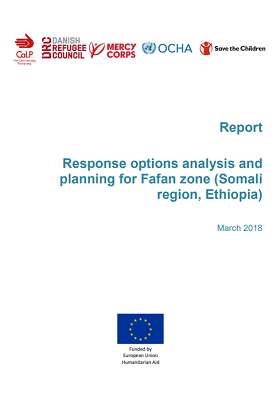
Response options analysis and planning for Fafan zone (Somali region, Ethiopia)
Guidelines and Tools
Between October 2017 and March 2018, the Consortium began the pilot in Ethiopia with the aim of providing technical and strategic support to country-based humanitarian organisations, enabling them to engage in collaborative assessments and decision making. Whilst the Consortium has not been conceived to...

Basic Needs Assessment Guidance & Toolbox Part 2: How-to Guide & Tools
Guidelines and Tools
This How-to Guide is Part 2 of the BNA Guidance & Toolbox, with Part 1 describing the background and concepts underpinning the BNA approach.
The How-to Guide describes the sequence of practical steps necessary to ensure a successful BNA during emergencies, from initiation of the BNA up to reporting and...
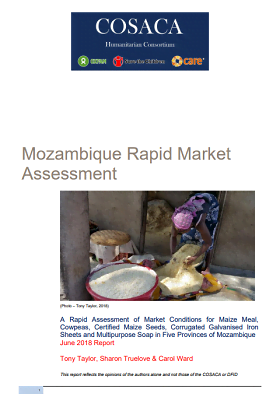
Mozambique Rapid Market Assessment
Report
Mozambique is a country prone to natural disasters, most markedly floods, cyclones, pest and disease outbreaks and frequent droughts. These regularly exacerbate the underlying poverty and food security situation and cause major damage and set back economic growth in disaster-affected areas. Meteorological...

Reviewing the Linkages between Gender, Market Assessments and Market-based Interventions
Report
From ‘Collected Papers on Gender and Cash Transfer Programmes in Humanitarian Contexts’. Existing gender inequalities mean that disasters and conflicts impact women, men, girls and boys differently. Cash based assistance is one of the most significant developments in humanitarian assistance in recent...

Minimum standard for market analysis (MISMA)
Guidelines and Tools
The objective of the Minimum Standard for Market Analysis (MISMA) is to guide the work of humanitarian practitioners across sectors and to ensure that, irrespective of the tool used, the key standard of market analysis is being met. By supporting high-quality market analysis, the MISMA intends to...

Lessons Learnt and Recommendations for Cash-for-Shelter Programmes in the Democratic Republic of Congo
Report
This document provides an overview of how cash and voucher assistance is being used by shelter partners in DRC and details the lessons learnt to-date. It goes on to put forward recommendations and opportunities to strengthen cash and market-based programming in the shelter/housing sector there. An...

A Meeting of Cash Working Group Leads: Sharing Experiences and Learning from Burundi, Ethiopia, Kenya, Madagascar, Tanzania, Somalia, South Sudan, Sudan and Tanzania
Report
Cash Working Group (CWG) leads from nine countries came together to share experiences and learn from one another. This report brings together observations and reflections from the meeting. It provides insights that are likely to be of interest to anyone involved in CWGs or discussions about the...
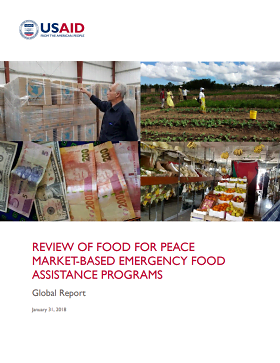
Review of Food for Peace Market-Based Emergency Food Assistance Programs Global Report
Report
Efficient and effective use of humanitarian funds is critical to meet the emergency needs of as many people as possible, especially as emergencies in developing countries have become more numerous, complex, and protracted. The United States Agency for International Development (USAID) Office of Food for...
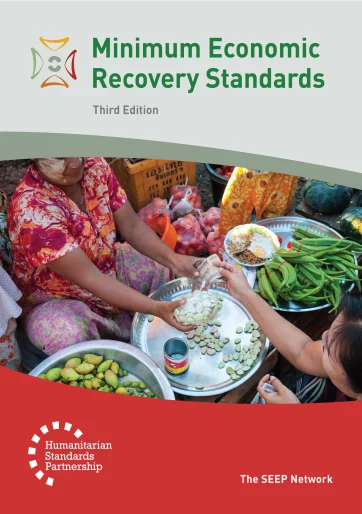
Minimum Economic Recovery Standards
Guidelines and Tools
The Minimum Economic Recovery Standards (MERS) are the internationally recognised consensus on best practices for building economic resilience for crisis-affected communities. SEEP developed and refined MERS over a ten-year process with input from hundreds of organisations and practitioners.
Available...

UNHCR Multi-Sector Market Assessment (MSMA): Charcoal, water, low-income rental housing and core-relief items in Maiduguri, Jere and Konduga, Borno State, Nigeria
Report
To assess the capacity of markets to respond to cash based initiatives (CBI), including multi-purpose cash grants (MPG), the UNHCR Multi-Sector Market Assessment (MSMA) was piloted in Maiduguri Municipal Council (MMC), Jere and Konduga Local Government Areas (LGAs) of Borno State, Nigeria in July 2017....

Market Systems in Libya: Assessment of the Wheat Flour, Insulin, Tomato and Soap Supply Chains
Report
The Market Systems in Libya assessment aims to provide humanitarian organisations with a better understanding of market dynamics in Libya, information on key supply chains and how they have been impacted by ongoing conflict, and the necessary foundation to examine the potential of scaling up market and...

Libya Cash and Markets Working Group (CMWG) Advocacy and Communications Plan
Report
The Libya Cash & Markets Working Group (CMWG) Strategic Framework & 2017 Workplan outlines ‘communication and advocacy’ as a ‘deliverable’ for supporting ‘HC/HCT decision making’.
Throughout March & April 2017, the CMWG Steering Committee used a series of tools as part of a seven-step process...
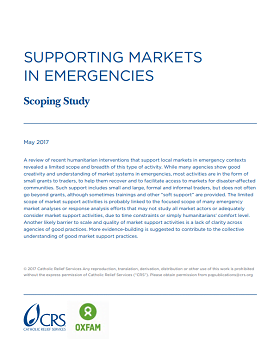
Supporting markets in emergencies. Scoping study
Report
A review of recent humanitarian interventions that support local markets in emergency contexts revealed a limited scope and breadth of this type of activity. While many agencies show good creativity and understanding of market systems in emergencies, most activities are in the form of small grants to...

Cash and Markets Monthly Dashboard DRAFT April 2017
Guidelines and Tools
• The cash and markets, monthly dashboard presents current data on market prices of key commodities and the cost of the minimum expenditure basked (MEB) across Somalia. In addition, it also provides key highlights relevant to cash and market interventions.
• Page one presents the cost of the food MEB...
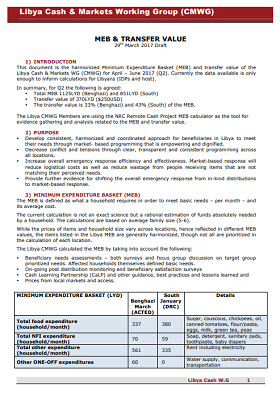
MEB and Transfer Value Guide
Guidelines and Tools
This document is the harmonized Minimum Expenditure Basket (MEB) and transfer value of the Libya Cash & Markets WG (CMWG) for April – June 2017 (Q2). Currently the data available is only enough to inform calculations for Libyans (IDPs and host).
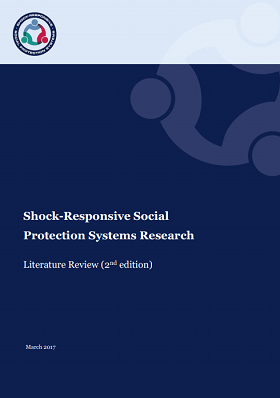
Shock-Responsive Social Protection Systems Research: Literature Review (2nd Edition)
Report
DFID has commissioned research into Shock-Responsive Social Protection systems, to further understand the nature of the interaction between social protection, humanitarian and disaster risk management systems and ways in which long-term social protection systems can be scaled up to provide support in...



